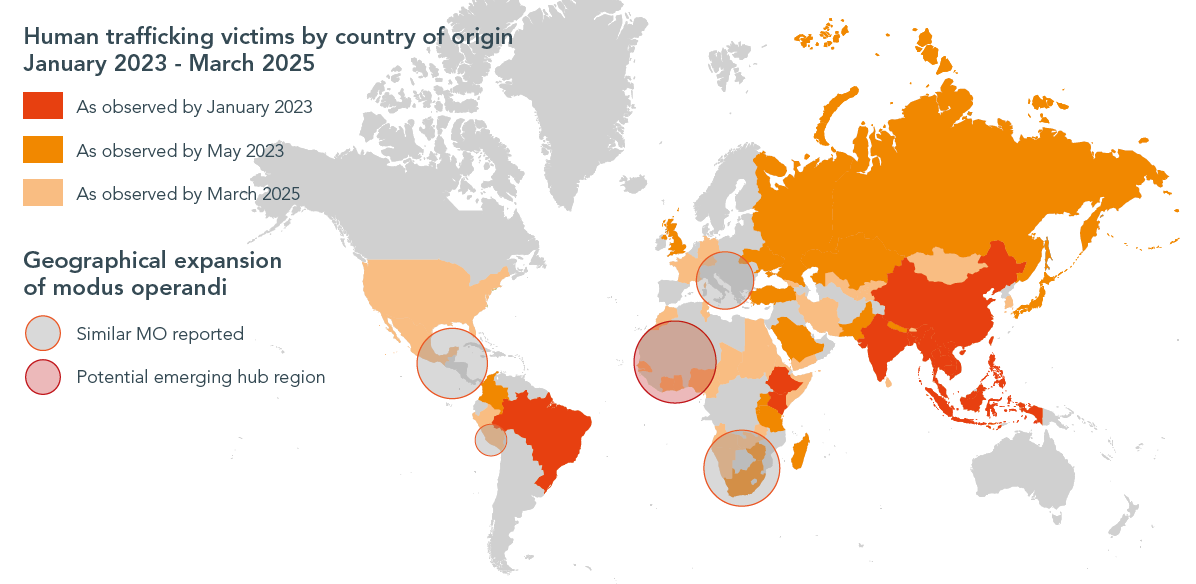- Les victimes de la traite d’êtres humains aux fins de criminalité forcée proviennent de plus de 60 pays
- L’Afrique de l’Ouest apparaît aujourd’hui comme une possible plaque tournante régionale pour les centres d’escroquerie en ligne
LYON (France) – D’après de nouvelles informations publiées par INTERPOL sur les tendances criminelles, les centres d’escroquerie fonctionnant grâce à la traite d’êtres humains ont élargi leur champ d’activité au monde entier.
En mars 2025, des ressortissants de 66 pays, de tous les continents sans exception, ont été victimes de trafiquants et attirés dans ce type de centres.
Selon une analyse des tendances en matière de criminalité fondée sur des données provenant des notices INTERPOL en lien avec ce phénomène publiées au cours des cinq dernières années, 74 % des victimes concernées ont été transportées vers des centres de la région d’Asie du Sud-Est, où est née cette forme de criminalité.
Toutefois, de plus en plus de centres d’escroquerie en ligne sont apparus dans d’autres régions, notamment au Moyen-Orient, en Afrique de l’Ouest – qui pourrait devenir une nouvelle plaque tournante régionale – et en Amérique centrale.
L’analyse a montré que près de 90 % des personnes facilitant cette traite d’êtres humains étaient originaires d’Asie et 11 % d’Amérique du Sud ou d’Afrique.
Pour 80 % d’entre eux, il s’agissait d’hommes, et 61 % étaient âgés de 20 à 39 ans.

Une crise mondiale
D’après les estimations, les centres d’escroquerie, à l’origine concentrés dans quelques pays d’Asie du Sud-Est, ont attiré des centaines de milliers de victimes de la traite d’êtres humains, généralement par le biais de fausses offres d’emploi, et ces victimes étaient enfermées dans des camps et forcées à commettre des escroqueries par manipulation psychosociale en ligne.
Si les personnes qui travaillent dans les centres d’escroquerie ne sont pas toutes des victimes de la traite d’êtres humains, celles qui sont retenues contre leur gré font souvent l’objet d’extorsions, selon le système de la servitude pour dettes, mais aussi de violences, d’exploitation sexuelle, de tortures et de viols.
Les escroqueries en ligne conçues par les centres ciblent une deuxième catégorie de victimes dispersées dans le monde entier, qui subissent souvent des préjudices financiers et psychologiques désastreux.
Depuis 2023, INTERPOL recueille des données sur l’évolution de cette double tendance criminelle, qui est passée d’une menace centrée sur la région Asie du Sud-Est à une crise mondiale, et a publié une notice orange afin de faire connaître la menace grave et imminente qu’elle constitue pour la sécurité publique.
En 2024, une opération mondiale coordonnée par INTERPOL, au cours de laquelle des policiers nationaux sont intervenus dans un centre d’escroquerie à échelle industrielle aux Philippines, a mis au jour des dizaines de cas de victimes qui avaient été dupées et forcées à commettre des escroqueries.
La même année, une opération d’INTERPOL a permis à la police de démanteler un centre d’escroquerie en Namibie, dans lequel 88 jeunes avaient été contraints de se livrer à des actes d’escroquerie.
Utilisation croissante de l’IA
Les informations publiées récemment par INTERPOL montrent également comment les nouvelles technologies et la corrélation avec d’autres formes graves de criminalité pourraient entraîner une transformation des centres d’escroquerie faisant travailler des victimes de la traite d’êtres humains à mesure que cette tendance criminelle évoluera.
On constate que les malfaiteurs ont de plus en plus souvent recours à l’intelligence artificielle.
Ils l’utilisent notamment pour concevoir de fausses offres d’emploi convaincantes et attirer ainsi des victimes de la traite d’êtres humains, ou pour créer en ligne, par la technologie de l’hypertrucage, des photos ou des profils utilisés aux fins d’extorsion ou d’escroqueries aux sentiments, entre autres activités de manipulation psychosociale.
De plus, les éléments analysés par INTERPOL montrent que les itinéraires par lesquels les victimes sont acheminées vers les centres d’escroquerie sont parfois les mêmes que ceux utilisés pour les trafics de stupéfiants, d’armes à feu et d’espèces sauvages protégées.
Les zones dans lesquelles des centres d’escroquerie sont apparus en Asie du Sud-Est sont également des plaques tournantes du trafic d’espèces menacées d’extinction telles que les tigres et les pangolins, signe d’une probable diversification des activités criminelles.
« Le champ d’action des centres d’escroquerie en ligne couvre l’ensemble du globe, ce qui représente un défi dynamique et permanent à l’échelle de la planète. »
« Pour arrêter l’expansion mondiale rapide de cette menace, une riposte internationale coordonnée est nécessaire. Nous devons accroître l’échange d’informations entre les services chargés de l’application de la loi des pays concernés, dont le nombre ne cesse d’augmenter, et renforcer les partenariats avec les ONG qui viennent en aide aux victimes et avec les sociétés de technologie dont les plateformes sont exploitées. »






